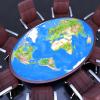
Policy Brief #10, December 2012. In October 2012, IIASA brought together over 800 leading scientists and experts from a diverse range of disciplines, regions, and institutions to explore the power of science to find future "worlds within reach” and to chart a path “from science to policy.” The conference showed how systems analysis can diagnose complex problems and deliver smart solutions with multiple benefits for both the planet and its people.
Summary
- The $70-trillion global economy dominates key planetary life-support systems like the carbon, nitrogen, and water cycles. We are thus obliged to become active planetary stewards, given the growing possibility of human and environmental catastrophe.
- This requires a “new Enlightenment” that combines new technologies in energy, genomics, and information technology with new lifestyles to ensure a more efficient use of the world’s resources.
- Reducing poverty and inequities is essential to achieving those goals, and vital to helping the most vulnerable adapt to inevitable climate change.
- Avoiding planetary boundaries and achieving better human lives need not be in conflict. With a world urban population expected to double, greener more “livable” cities are vital. Universal access to electricity can deliver release from poverty, improved well-being, and, if properly planned, the safeguarding of the environment.
- Stable or declining human numbers are essential for a sustainable future. But, thanks to falling fertility, there is now a high probability of peak population by the middle of the century. Humans should be seen as a resource: having brains to think as well as just mouths to feed. The key to unlocking that resource is education. The world needs a drive to achieve secondary education for all, from which half the global population is still excluded.
- There is continuing uncertainty about whether the world is best fed by using new technologies to maximize food production, or by concentrating on helping poor small farmers to do better. Resolving this issue will be vital in protecting essential ecosystems, such as rainforests, and finding new paths to sustainable development in the tropics. This is a key task for systems science.
- The world needs new forms of governance to handle challenges such as resource scarcity, water shortages, and climate change. Business needs to make sustainable investments in the new planetary stewardship. But it also needs new regulatory regimes to encourage long-term investment in sustainable technologies.
- Systems analysis has come of age. The scientific community is vital for analyzing global problems, developing better technologies, and encouraging new aspirations and lifestyles. But scientists cannot determine society’s path. They can, and should, however, guide it.